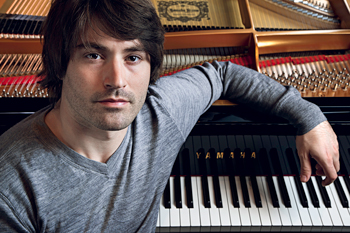by Mike Telin

On Sunday, July 31 at 8:00 pm in the Maltz Center for the Performing Arts, Dan Tepfer will present his critically acclaimed project titled “Goldberg Variations/Variations” as part of the Cleveland International Piano Competition and Festival.
By his own admission, Tepfer’s upbringing was anything but typical. “I grew up in Paris, France with American parents, and outside of popular culture. We never had a TV, but I played a lot of music and read a lot of books, so the way I experienced culture was different,” the pianist said during a telephone conversation from his home in Brooklyn, New York.
“I heard a lot of classical music because my mom is an opera singer, and I heard a lot of jazz because my grandfather was a jazz pianist. My parents also had a bunch of records of the Beatles, so all of this music was kind of the same thing to me. I don’t think that music belonging to a certain style makes it good or bad, and if you feel that quality is separate from style, then you have a pluralistic vision of music.”
Tepfer’s road to becoming a jazz musician was also out of the ordinary. He began studying classical piano at the Paris Conservatoire-Paul Dukas at the age of six, but when it came time for college he opted out of conservatory and earned a bachelor’s degree in astrophysics from Scotland’s University of Edinburgh. Tepfer remained a self-taught improviser until his 20s when he entered the jazz program at the New England, earning a master’s degree.
The roots of “Goldberg Variations/Variations” can be traced back to Tepfer’s teenage years. In his article titled Doing it Bachwards: my unexpected Goldberg Variations, which I highly recommend reading, the pianist writes:
In my early teens, I discovered the Goldberg Variations at a friend’s house in Paris, as recorded by Glenn Gould in 1981, and they took hold of me then like the most beautiful and tenacious earworm. Still, it was only in my early twenties, while studying jazz at the New England Conservatory, that I got a score, and even then, it took me a long time to look past the Aria.
In our conversation Tepfer explained that once he began learning Bach’s music, it still took ten years before the “Variations/Variations” project came to fruition. “It’s not that I had the idea of doing a project where I would improvise on a classical piece, and then chose the Goldberg Variations. It’s that as I started learning them I found them so fascinating that I just started improvising on them. Bach presents such clear ideas in the Goldbergs — every variation is kind of an etude in its own right. Because every one of them follows the same chord progression, you can’t help but want to improvise your own versions of them.”
Tepfer noted that while he has some idea of how he will approach each of his improvised variations, each performance is completely different. “It’s important to me to know that when I’m improvising, I really am improvising. But that said, I have developed strategies for a lot of them. For example, every third variation of the Goldberg is a canon, so I’ll either improvise a canon at that interval — which I can do, but not in as sophisticated a way as Bach of course — or I’ll just focus on the interval that Bach uses. For example, for a canon at the fourth I’ll only use fourths in my variation. So there are loose concepts that I use, but I will do it differently every time.”
With each performance of Goldberg Variations/Variations running between 80 and 90 minutes, how does Tepfer manage to stay focused as he jumps from interpreting Bach’s music to creating his own? “One of my favorite aspects of the project is that staying focused is a big challenge. I’m interested in meditation and the nature of awareness, and I think the project is a great way of seeing where I am with that. But I just try to stay relaxed and in the present.”
Regarding that Edinburgh degree, Tepfer said that although he wouldn’t say that he actually makes use of astrophysics, but the things he learned from studying that discipline do influence his musical projects. “I’ve really been into math, science, and computer programming since I was a young child, and it’s something that I’ve always kept up with because it fascinates me.
“For example, three days ago I gave a pretty big concert in Montpellier in the south of France,” he said. “It was one the first concerts where I’ve presented my “Acoustic Informatics” project. I’ve written algorithms for my computer which respond in real time to what I’m improvising on a Yamaha Disklavier CFX. Nothing is pre-programmed or pre-recorded — the keyboard is reacting in real time with notes of its own. I’ve never heard a Disklavier used this way so I’m pretty excited about it. It’s really fun and it’s possible that I wouldn’t have gotten into that if I hadn’t studied physics and developed that part of me.”
Published on ClevelandClassical.com July 28, 2016.
Click hereveland for a printable copy of this article



